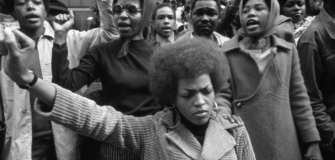Black Love and Retreats: A Conversation w/ Dr. Walters-Knight
Share
Upspoken had the privilege of talking to Dr. Cathia Walters-Knight, a licensed clinical psychologist. She hosted a Black couples retreat in May and was preparing to host a Black women wellness retreat for July. Dr. Walters-Knight gives us a glimpse into the Black couples retreat experiences and gives advice on love, relationships, and wellness.
Could you start off by telling our readers a little about what you do and how your work supports Black women and their wellness?
I am a licensed clinical psychologist and I work with Black women and couples. The work I do is around finding yourself, learning how to set better boundaries, working with any mental health challenges, and creating a communicative relationship. That work includes minor adjustments to big life changes such as marriage, having a child, job transitions, basic relationship advice – to more severe issues on the mental health spectrum such as depression and trauma. In terms of Black women specifically, I hold Black women support groups, wellness retreats, and Black couple retreats.
Tell us about the Black couples retreat at Lake Tahoe you recently hosted?
The retreat hosted five couples for one weekend in Lake Tahoe and kicked off with some socializing. For the next two days, we focussed on building healthy relationships with your partner. So far the feedback has been positive! The long-term plan includes a 6-month check-in and then in a year we will gather to discuss any changes or struggles the couples have experienced and may need to address.
I facilitated discussion around what the building blocks for healthy relationships are, strengthening those building blocks, effective communication, and managing conflict. For example, if the topic of conversation was affirmations or how we work with differences and create appreciation based on these differences, I would give them an exercise, then they would discuss it and actively work on putting what they’ve learned into action.
Each couple was responsible for cooking a meal for the group, whether it be breakfast, lunch, or dinner. This helped couples realize that they can also bond and create a deeper and more meaningful relationship by doing something as simple as creating a meal together. I saw couples for the first time, realize “Oh, we do have to talk!” There were a lot of activities that they all seemed to enjoy.
What should couples consider before going on a retreat together?
I had each couple take an assessment on their love language, identify what they hoped to get out of the retreat, and what they specifically wanted to work on. Naturally, one of the things that people worry about with retreats like this is the cost. I tell couples that although this may look costly, when you think about how much you spend to see a therapist, it really isn’t. With the retreat, you’re getting someone who will listen, teach you practical skills, give you the opportunity to practice these new skills while there, and talk through any issues that may arise. You’re basically paying for 12 hours of concentrated therapy versus 12 hours spread over 3 months.
What are some key ways to communicate in a relationship?
We all have different styles of communication, and I tend to borrow from John Gottman, one of the founding fathers of relationships. He talks about the Four Horsemen of the Apocalypse and the way these communication styles affect our relationships. I discuss how when we communicate we do so both actively and passively through our behaviors and body language. I talk a lot about recognizing that there are two realities, yours and your partner’s, and both realities are valid. The problem I see a lot of times is that conflict is inevitable, so what becomes important is developing understanding.
Understanding that you both deserve to be loved and respected and that it hurts just as much from where you’re standing, as it does from where I’m standing. You must understand that your worldview encompasses everything you’ve experienced in life from birth, childhood, adulthood, and past relationships and that this worldview is different from the lens your partner is looking through. When there is a mutual understanding that some problems cannot be solved, no matter how long you’ve been with your partner, it’s important to come together and attack these issues as a team.
What advice would you give women to be empowered and speak up for what they need in their romantic relationships?
One assignment I give to all women (and sometimes men) is to ask themselves, “Who am I?” Understanding who you are as a person makes it easier to create boundaries for yourself. If you know where you begin and end, it’s easier to pinpoint what’s working for you and what’s not. You cannot create and articulate boundaries if you don’t know who you are.
When you’re in a conversation with your partner and your needs aren’t being met, you have to begin with self-reflection. What’s going on with me right now? What’s being triggered? What are my needs at this moment?
As Black women, we are socialized to be caretakers, and somewhere along the line, we are told that if you try to take care of yourself, you’re being selfish. Black women need to debunk this myth. A strong Black woman is someone who is able to say, “You know what, I like you and I love you, but I love me more. And, in order to like and or support you, I need to do these things for myself. I need to make myself a priority and take care of myself.” When you’re in a relationship it’s important to be able to say, “This is what I’m feeling, this is why I’m feeling this way, and this is what I need from you in order for this to move forward.” The key is to be self-reflective.
Can you tell us a little about your upcoming retreat for Black women?
This retreat began as an extension of the Black women core group I started with. As women, we need space to let our hair down and put our feet up, and to just be. When we take vacations and spend time with family, we still end up taking on the role of “caretaker.” The idea behind this retreat is to give these women one week where all the focus is on themselves and who they each are as a person – without guilt, repercussions, or shame. These Black women are given the space to be present, self-reflective, and think about where did they lose themselves. It’s all about getting them to recognize that if they don’t take care of themselves, they aren’t going to be in any shape to take care of their loved ones.
What are some ways women can develop healthy relationship practices and manage stress in their everyday life?
There are lots of different strategies that focus on developing healthy relationship practices that start with prioritizing yourself. I teach B.A.C.E. B is for the physical Body and recognizing that you need to get enough sleep –“When I wake up in the morning do I feel refreshed?”; A is for Activities – there needs to be a balance between work life and personal life; C is for Community – what does my social network look like?; E is for Enjoying life – the question I often ask is, “Are you living or are you existing?”
When it comes to managing stress, engaging in mindfulness practice through meditation, yoga, and breathing exercises is always helpful. And, if you need to, talk to someone and find a professional.
What are some common characteristics among couples with healthy relationships?
Communication, mutual care, and respect. Caring behaviors, showing appreciation for little and big things.
A healthy relationship will have …
- Mutual care and respect at the foundation and core.
- Healthy forms of communication.
- Caring behaviors and showing appreciation for little and big things. Being able to hold each other and have a conversation without feeling like you have to solve a problem immediately.
- Showing love and kindness. Love isn’t only shown through sexual intimacy.
- Know that you are friends.
We are all constantly learning from our own experiences, from each other, and from well-respected experts like Dr. Walters-Knight. At Upspoken we want you to know, that if you’re struggling in your relationship, it’s okay to seek professional help! Dr. Walters-Knight’s door is always open. Reach out to her or another.




Follow Us